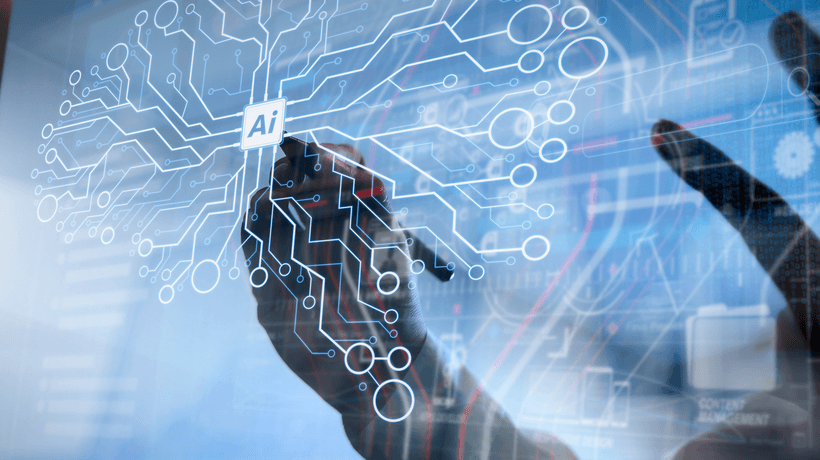A Deep Dive Into AI-Based LMS Platforms
The world of Learning Management Systems (LMSs) has been revolutionized by the advent of AI, transforming how organizations deliver training and education. This guide explores the fundamentals of AI-based LMS platforms, the benefits they offer, and the future of AI in corporate learning.
What Is An AI-Based LMS Platform?
An AI-based LMS platform leverages Artificial Intelligence to enhance the delivery, personalization, and management of online learning experiences. Unlike traditional LMS platforms, AI-powered LMS systems analyze data to predict learning patterns, adapt content to individual learners, and automate administrative tasks. This results in a more efficient, engaging, and tailored learning experience.
The Benefits Of AI In An LMS
AI integration in an LMS offers numerous advantages that elevate both learning outcomes and administrative efficiency:
- Personalized learning
AI algorithms analyze learners' behavior, preferences, and performance to deliver personalized content, ensuring that each user receives training tailored to their needs. - Enhanced engagement
By incorporating AI-powered gamification, adaptive learning paths, and interactive content, learners remain more engaged and motivated throughout the training process. - Efficient content creation
AI-powered content creation tools can generate quizzes, assessments, and even entire courses based on existing materials, significantly reducing the time and effort required by Instructional Designers. - Improved assessments
AI-powered assessments offer real-time analysis of learner performance, identifying strengths and areas for improvement. These assessments can adapt in difficulty based on the learner's responses, providing a more accurate measure of understanding. - Automation of administrative tasks
Routine tasks such as grading, attendance tracking, and reporting can be automated, allowing instructors to focus on delivering high-quality education.
Differences Between Standard LMSs Vs. AI-Powered LMSs
The key difference between a standard LMS and an AI-powered LMS lies in the level of automation and personalization.
- Standard LMS
Typically relies on static content delivery with limited adaptability to individual learners. It requires significant manual input for content creation, assessment grading, and administrative tasks. - AI-powered LMS
Utilizes Machine Learning algorithms to automatically adapt content to each learner's needs, automate administrative tasks, and provide in-depth analytics and insights. The result is a more dynamic, efficient, and effective learning environment.
Key Features Of AI-Powered LMS Platforms
AI-powered LMS platforms are equipped with advanced features that distinguish them from traditional systems:
- Adaptive learning paths
Automatically adjust the learning journey based on the learner's progress and performance, ensuring a personalized experience. - AI-driven analytics
Provides actionable insights into learner behavior, course effectiveness, and training ROI, allowing organizations to make data-driven decisions. - Intelligent content curation
Recommends relevant courses and materials based on learner preferences and job roles, enhancing the learning experience. - Automated assessments
Includes AI-powered assessments that can evaluate a learner's understanding in real time and adapt the difficulty accordingly. - Chatbots and virtual assistants
Offers 24/7 support to learners, answering questions and guiding them through the learning process.
Different Use Cases Of AI In Learning Management Systems
AI-based LMS platforms can be deployed across various industries and use cases:
- Corporate training
AI-powered LMS platforms help businesses deliver personalized, engaging, and effective employee training programs, crucial for upskilling and reskilling. - Higher education
Universities use AI to enhance the learning experience by providing personalized learning paths and improving student retention. - Compliance training
AI-driven analytics ensure that compliance training is thorough and effective, reducing the risk of non-compliance. - Customer education
Companies use AI-powered LMS to educate customers on products, enhancing user satisfaction and reducing support costs.
Current Challenges And Considerations In AI-Based LMSs
Despite the numerous benefits, implementing an AI-powered LMS comes with challenges:
- Data privacy
AI systems require large amounts of data to function effectively, raising concerns about data privacy and security. - Integration with existing systems
Integrating AI-powered LMS platforms with existing IT infrastructure can be complex and costly. - Bias in AI algorithms
AI systems can inadvertently reinforce existing biases in the data they are trained on, leading to unfair outcomes. - User adoption
Transitioning from a traditional LMS to an AI-powered system may require significant change management efforts to ensure user adoption.
Future Trends In AI-Powered LMSs
As AI continues to evolve, several trends are expected to shape the future of AI-based LMS platforms:
- Increased personalization
AI will offer even more personalized learning experiences by analyzing a wider range of data points, such as emotional engagement and social learning interactions. - AI-driven content creation
The use of AI in content creation will expand, enabling the automatic generation of more complex and diverse learning materials. - Advanced predictive analytics
AI-powered LMS platforms will use predictive analytics to anticipate learner needs, suggest interventions, and prevent potential dropouts. - Integration of AI with Virtual Reality (VR)
Combining AI with VR will create immersive learning experiences that replicate real-world scenarios for more effective training.
How To Deploy The Best AI-Based LMS
To successfully deploy an AI-based LMS, consider the following steps:
- Assess organizational needs
Determine the specific needs of your organization and how an AI-powered LMS can address them. - Choose the right vendor
Select an LMS vendor with a proven track record in AI integration, ensuring they offer the features and support required for your use case. - Plan for integration
Ensure that the AI-powered LMS can seamlessly integrate with your existing systems, including HR, CRM, and other enterprise software. - Train stakeholders
Provide training for administrators, instructors, and learners to ensure smooth adoption and effective use of the platform. - Monitor and optimize
Regularly review the performance of the AI-powered LMS and make adjustments as needed to optimize learning outcomes.
Conclusion
AI-based LMS platforms represent the future of corporate learning, offering unprecedented levels of personalization, efficiency, and engagement. By understanding the benefits, challenges, and future trends, organizations can make informed decisions about deploying the best AI-based LMS to meet their training needs.










